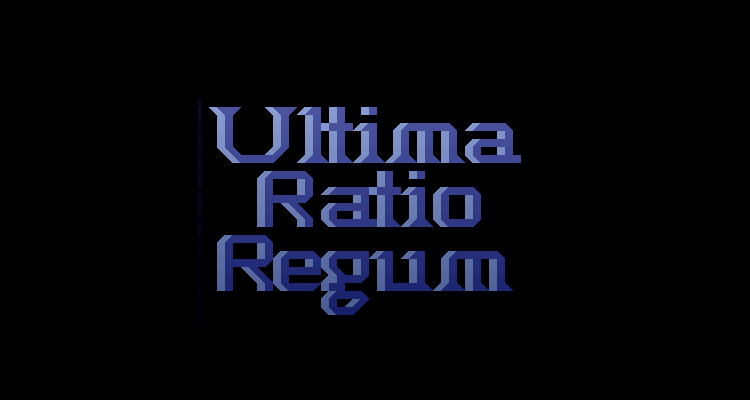Hello everyone, welcome back! This week we’re talking about some key gameplay mechanics, so let’s get into it:
Mechanical Complexity
So, firstly, I’ve had something of a revelation recently vis-à-vis the complexity of mechanics in games in general, and the required complexity of mechanics in URR. This revelation would go something like this – it’s fine to have a wildly complex central mechanic, or wildly demanding central mechanic if this is a real time game… but you really don’t want side mechanics to be wildly complex. This is one of those things that now seem incredibly obvious and self evident, but I hadn’t really crystallized until I went on a walk. Readers will know I do a lot of my coding thinking on walks, and I was thinking hard about two existing mechanics within URR, and how they would fit into the 0.11 release. It’s very important for the 0.11 release, and indeed the game going forward, to make sure that there’s no ambiguity about what to the central mechanics are, and that everything else should be supporting that overall design objective. However, the two mechanics I was thinking (worrying) about are the need for supplies in order to enter desert and snow regions, and the complexity which is involved in trading, coinage, buying, selling, exchange rates, and all these sorts of things. While I was out walking and thinking through all of them, and their ramifications in terms of how these pieces would interact in 0.11… it became increasingly clear that neither of these two mechanics – regardless of how much time I might have spent on them in previous years – supports the core mechanic. Both of them will only get in the way. This was a key revelation, and so this fortnight I’ve been making some major changes to both of these in order to massively streamline them, focus the player towards the core mechanics, ensure that side mechanics like these can still produce intriguing or strategic decisions, and also enable one of these mechanics to in fact do something novel and compelling that I hadn’t even previously thought about.
I’ll show you what I mean. I’ll type up each mechanic as it currently stands, and then what I’m changing it to. So, firstly:
Desert, Polar Regions, Supplies
Currently:
There are two types of supplies: water in canteens and survival equipment. You need water in canteens to move within a desert region – each step consumes one unit – and you need survival equipment to survive in polar regions – again, each step consumes one unit. These can be purchased at cities but one must have money to acquire them. If you are moving within these regions without the required supply a timer begins, and if you spend too long in one of these regions without the equipment in question, then you become unwell in some way from the extreme heat of the extreme cold. Another timer begins, where if you don’t leave in time then you will gain another significant ailment, and if you then don’t get that one dealt with quickly, your character dies. If you have the first level ailment for the desert or the polar regions you can prevent the second one by simply leaving these regions, but the second one can only be cured by going to a town or city or some other settlement. The first also will stick around until you go to a settlement.
Changing to:
You can go anywhere on the planet with no need for supplies of any kind.
The reason I’ve made this change is because I could see so many potential scenarios where this was only going to get in the players way. I had originally imagined that what it would do is to give certain regions of the game world a little bit more interest, a little bit more danger, and to potentially encourage the player to properly kit up before exploring certain areas. The Age of Sail / the Age of Exploration is the historical era I look back on with the most fascination; The Curious Expedition is perhaps my favourite roguelite / roguelikelike to date; and these were certainly both strong inspirations here. I do still think that these were perfectly sensible gameplay design goals, but the problem is there’s going to be so many scenarios where you can’t advance – even having solve a riddle thread – because you lack the resources. People have often noted that in puzzle games it can be very frustrating when you solve the puzzle, but for whatever reason you can’t input the solution to your puzzle. In a real-time puzzle game such as Braid this can be a pure mechanical input issue, but here, I think as a player I would be absolutely infuriated if I’d finally deciphered a really challenging complex set of riddles, and I know exactly where to go, and what to do, to make major progress… and then realised I didn’t have any supplies, nor the money to to get them, and thus I would now start just need to start thinking about and planning other things in order to get the money, then get the supplies, to then complete the riddle. Without exaggerating, I think that will just lose me players. It reminds me of those game design discussions about how a “bad” game mechanic is one that presents the player with a problem solely in order to then offer them the solution to that problem. While that idea is generally invoked in discussions around microtransactions and all that kind of garbage monetization vileness, a similar idea exists here. The only reason supplies and water presently exist are to get you through desert and polar regions, but that’s only because I decided that you needed those to get through those regions.
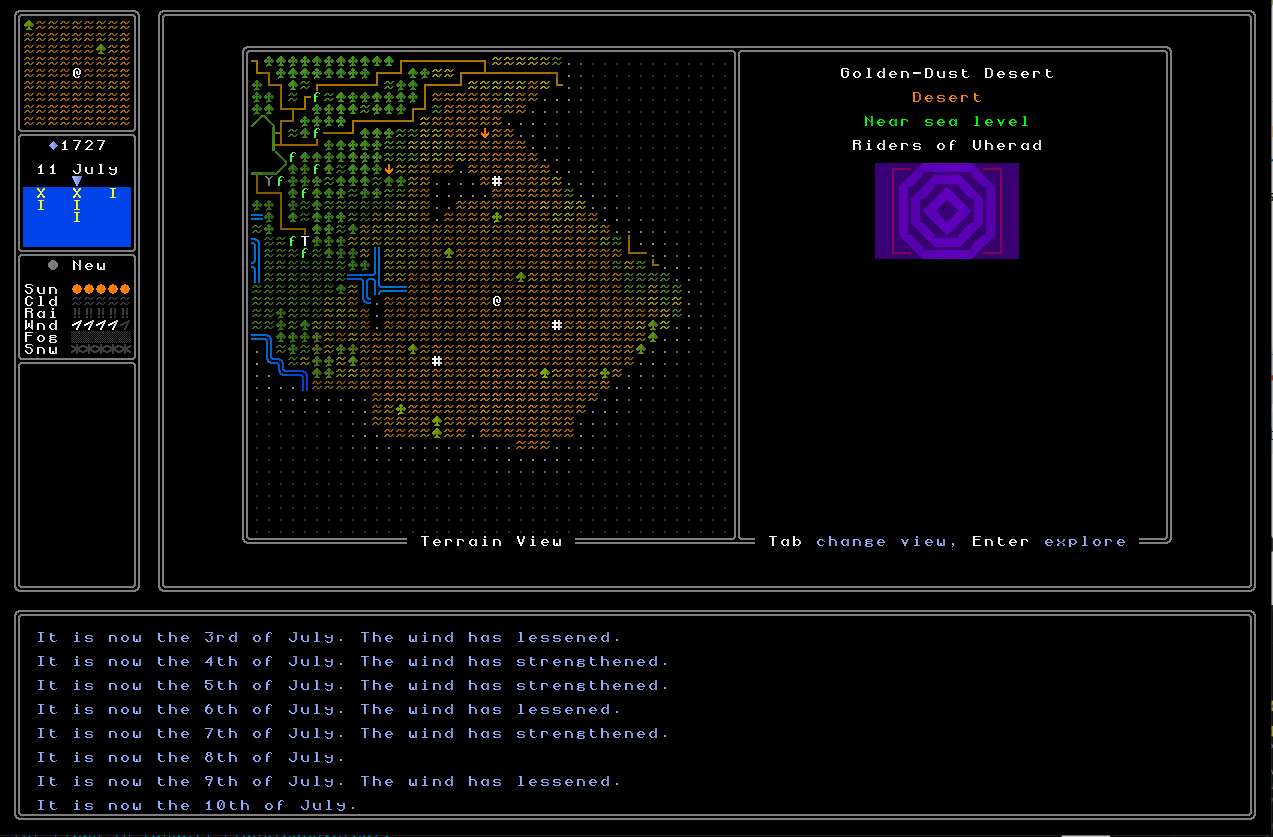
So, ultimately, just nothing is being added to the gameplay here. All it’s going to do is get in the way and distract from the core mechanic of solving riddles, and helping facilitate your character’s ability to do that thing and master their knowledge and place in the world. All this above mechanic would do is consume some of the in-game financial resources the player has been able to acquire, and do so in a way that fixes the problem which only exists in order to pose a problem. I really don’t like this at all. I also recognise that it’s going to be a very important for the core gameplay loop that player who just solved a riddle is then able to go and immediately input the solution. Now, I don’t mind that sometimes this might be made more challenging than normal – e.g. you discover that the place you need to go is within a particular building in the natio of a religion who despise you – but the core distinction here is that the religion example here is based on the player’s previous actions. That’s the vital distinction – it would be the player’s actions which shape what parts of the game world are safe, and which parts are riskier, rather than a completely arbitrary system making this choice on the player’s behalf. I think the latter is interesting, strategic, will add extra challenge as the game progresses, and enables players to make complicated decisions for both the short- and long-term – but the desert and polar supplies system just wasn’t doing it. So, this is now gone.
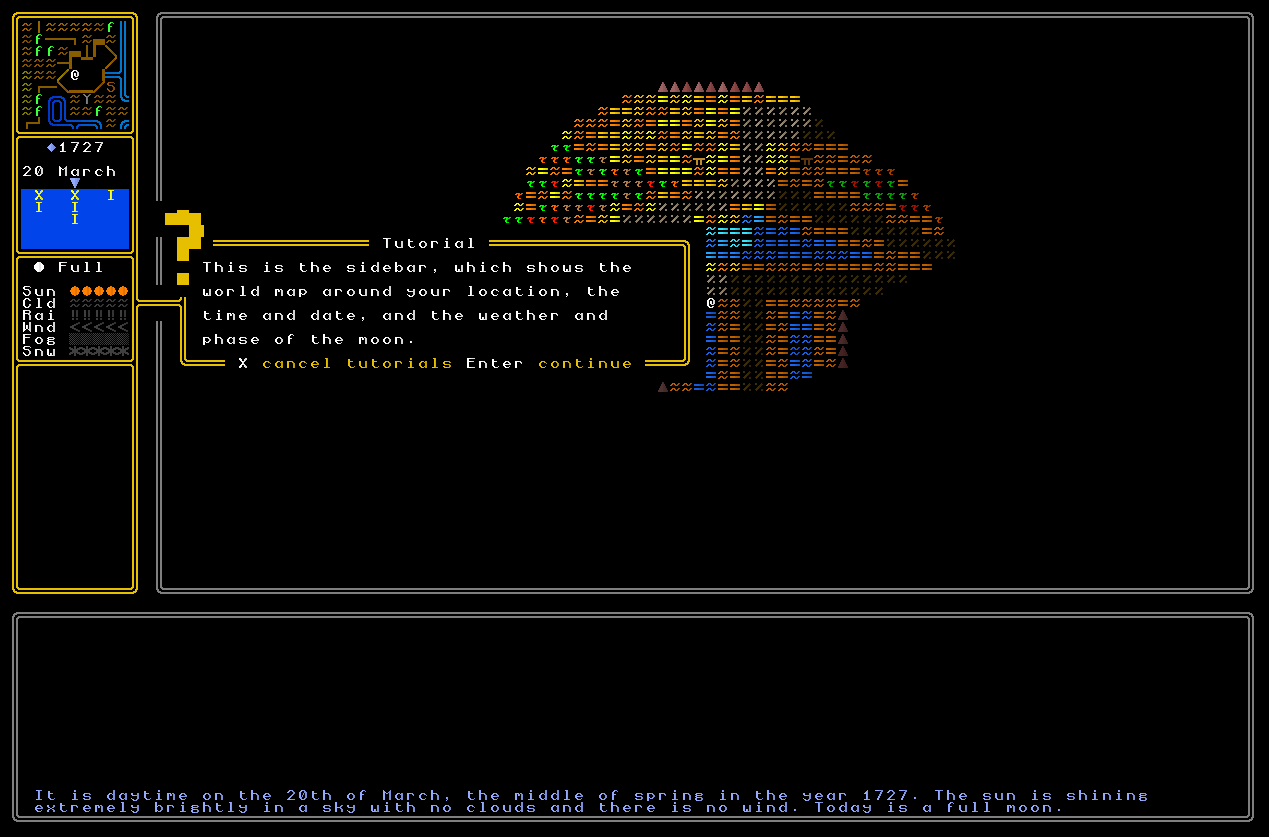
As a last aside here, one final justification was that the mysterious sphinx-houses, which will likely be the source of some of the hardest riddles but also some of the most substantial rewards, are found only in polar and desert regions – so this existing resources model would make them both more challenging to reach. Instead though, I can just add a complex lock on the door of each one (ooh, the idea of generating locks with various requirements, beyond just a key, is kind of interesting…) and that will achieve the exact same goal. That way the player will still need to have advanced reasonably within the game in order to have either the knowledge, or the items, or both, in order to get into the sphinx-houses, but they won’t be arbitrarily gated by this kind of mechanic. Again then, I think my original logic seemed to make sense at the time, but it no longer makes any sense now.
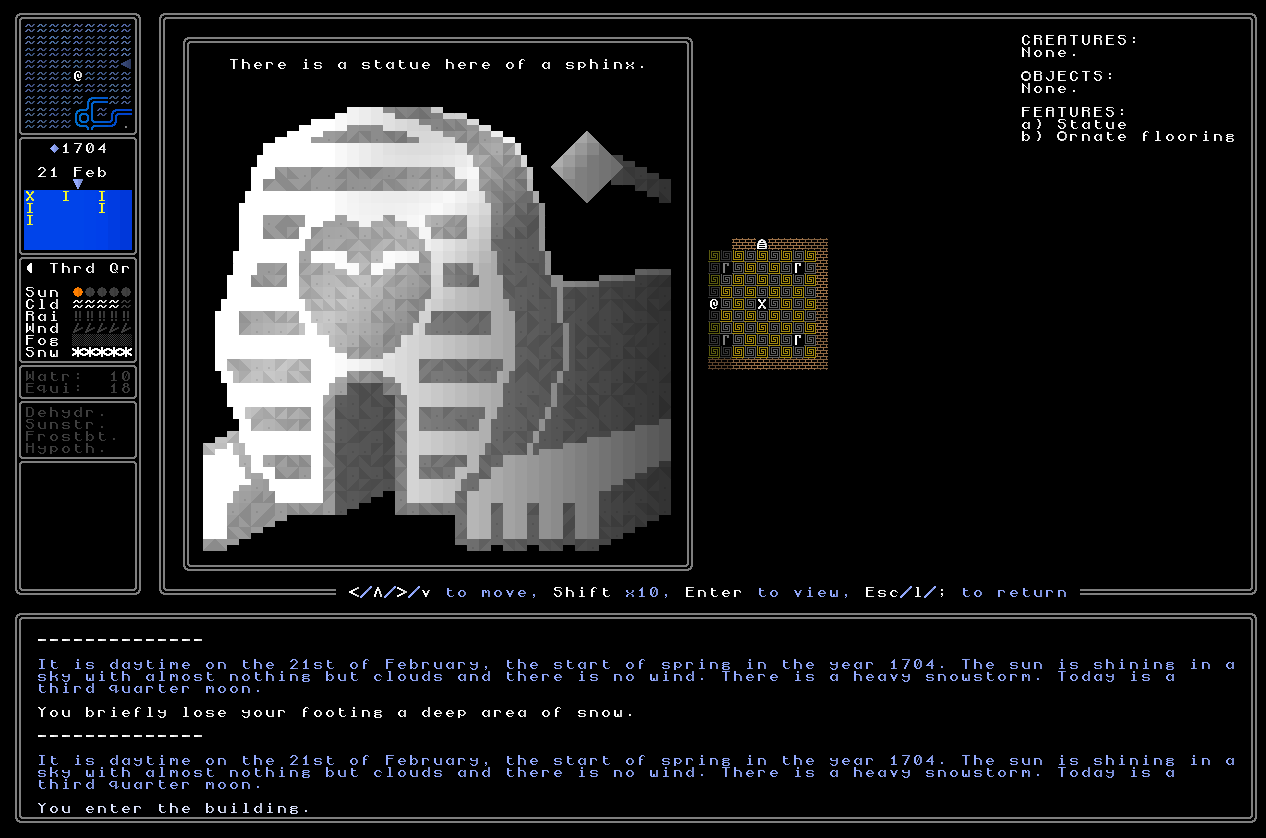
(I also might change trips by sea to be free as well, for the same reason. There are far more interesting things to think about spending money on, i.e. information, or some time soon, stuff to help one triumph in duels.)
(Canteens, though, will remain in the game – we’ll need those, for other things, later.)
Money, Buying, Selling, Coinage
Currently:
Every category of item has a different sale price in each different civilization. The sale price is contingent on what the policies of that civilization are. You can therefore potentially make profit by buying in one civilization and then selling something in another which particularly values that particular good or that particular thing. Currencies can also be exchanged, with exchange rates also varying based on a range of factors, with the more you exchange generally giving a better exchange rate due to how the calculation is done. You also need to exchange into a new currency each time you enter a new civilization, requiring you to to either find a currency exchange or to do the currency exchanging act at a city gate. The more you do this, the more that you use up your existing money, because a little bit is always lost each time you’re doing an exchange.
Changing to:
Everything sells for 50% of its purchase price and currencies cannot be exchanged.
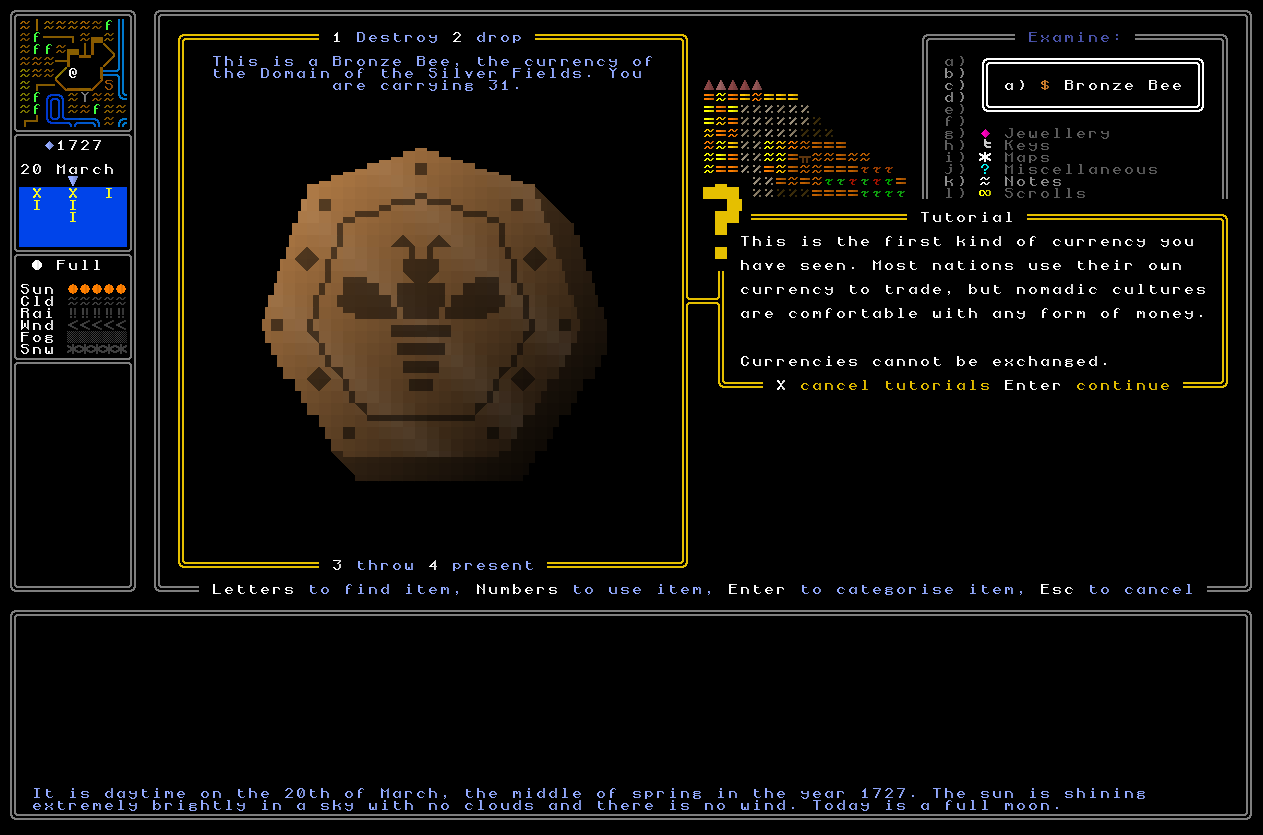
I think this is a pretty fantastic change. It has a huge amount of clarity, while still keeping important strategic decisions on what you buy and when, while also adding a new set as well in terms of where you want to make a purchase, when when you should advance into and you land, and things of this sort. Most importantly though, it means that rather than always having to do some kind of complex four-dimensional calculus equation in order to decipher what you should buy, where you should sell, and what the optimal travel paths to do so are, you will now instead just be faced with some extremely mechanically simple and transparent, but still strategically important, decisions. For example:
I’ve just acquired some money for the nation I’m in. Do I spend it now, or save it for something later?
I have some stuff to sell. Do I sell it here to buy stuff here, or in another nation where I want to buy stuff?
I’ve just acquired some money for a distant nation. Shall I go there now?
Equally, as I was out walking and thinking this stuff through, it also revealed to me the potential for rather nice system to encourage the player towards certain areas of the game world, or to give them ways to open up new parts of the game which might not be otherwise accessible. Specifically, if coins cannot be exchanged, then what we can do is sometimes have coins for civilizations the player hasn’t yet encountered spawn as rewards after completing a riddle! The more I think about it, the more I like this idea. It will reveal to players other lands, it will encourage players towards those lands if they don’t have much money left for the lands they currently know, and will enable them to immediately hit the ground running by buying things that they might require within that new land. Rather than coins and currency being a source of confusion, discovering a hoard of coins for another land will immediately open up some interesting new gameplay possibilities – and I can see this, perhaps, being something I code in to happen at a certain pace, to (along with riddles getting harder) push the player outside of their starting homeland? I love that I can now start properly thinking about pacing, progression, and the like…
(As an aside, at some point I’ll be implementing a massive generator for events to happen while you’re on the road, and maybe you can – 1/100, say – encounter someone willing to trade currencies? So it’s a strategic choice you have to make at that moment, but can’t anticipate. That sounds far more interesting, I think, but we’ll see when we get there)
And thus, finally, we also wave goodbye to the signs on currency exchanges:
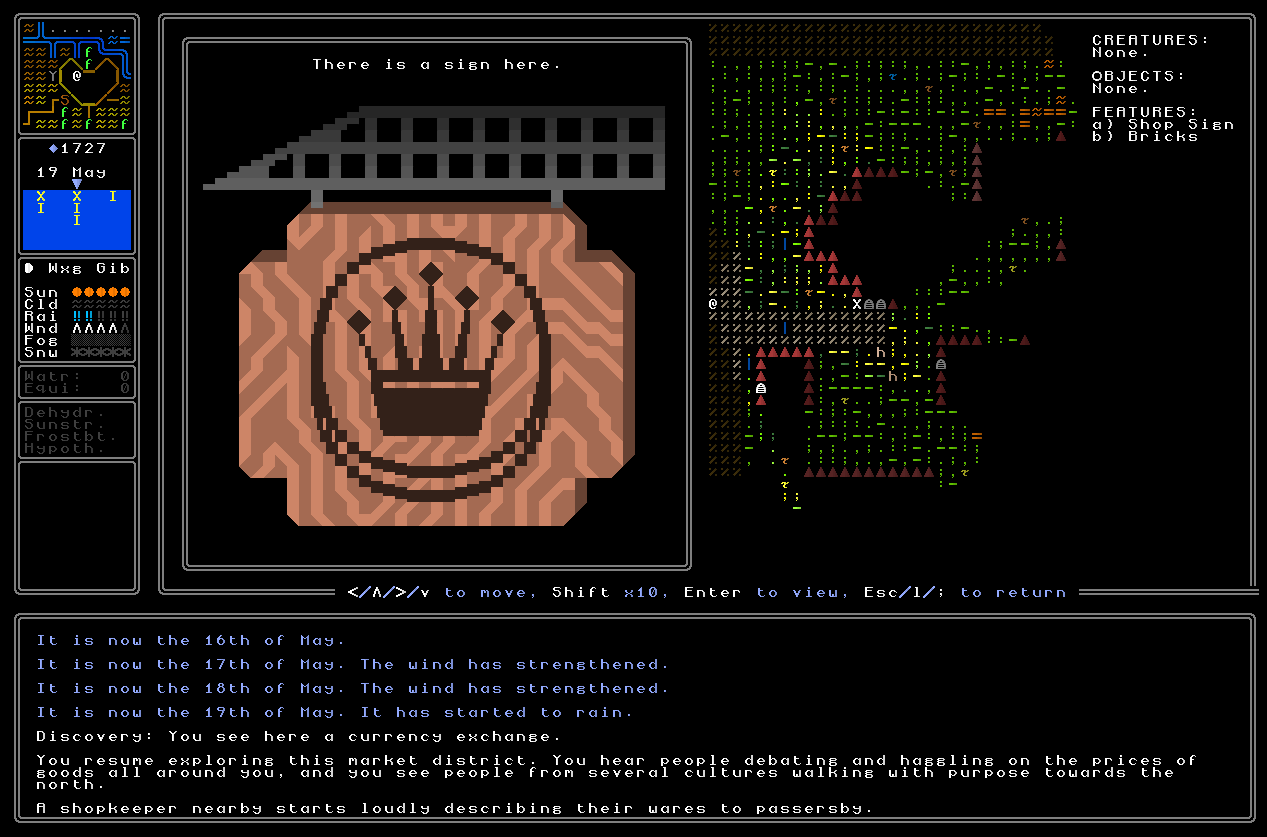
They were gorgeous, but their day is done. Currencies are massively simplified, massively clearer, and massively improved – and I’m excited now for their potential integration with and connection to other mechanics and the core gameplay loop.
Progress
So, those are two of the major changes this fortnight. Because these particular sorts of systems are quite distributed, implementing these changes has required a large number of small edits, such as altering the sidebar, altering the sidebar tutorial, removing the currency exchange mechanic from various places, and so on. It has also, though, included making a final, but not insignificant, change which flows out of these two, Players will remember that currently when you enter or leave a city a menu comes up on which you can continue to enter, or continue to leave, or exchange currency, or purchase supplies. Although this seemed like a good solution at the time in some ways, it has been bothering me for the last couple of years because it slows down the speed of movement of the game a lot, and it’s awkward to be using the arrow keys to move around the map and then suddenly also be using those keys to navigate a menu which subsequently appears. However, with supplies now disposed of, and currency changes now disposed of… there’s absolutely no reason for this wretched menu to ever exist! As such, you can enter and leave cities smoothly and freely as was once the case before. This sounds like a trivial thing, but it genuinely makes moving around the game world and looking into cities feel far more natural and far faster, as shown here:
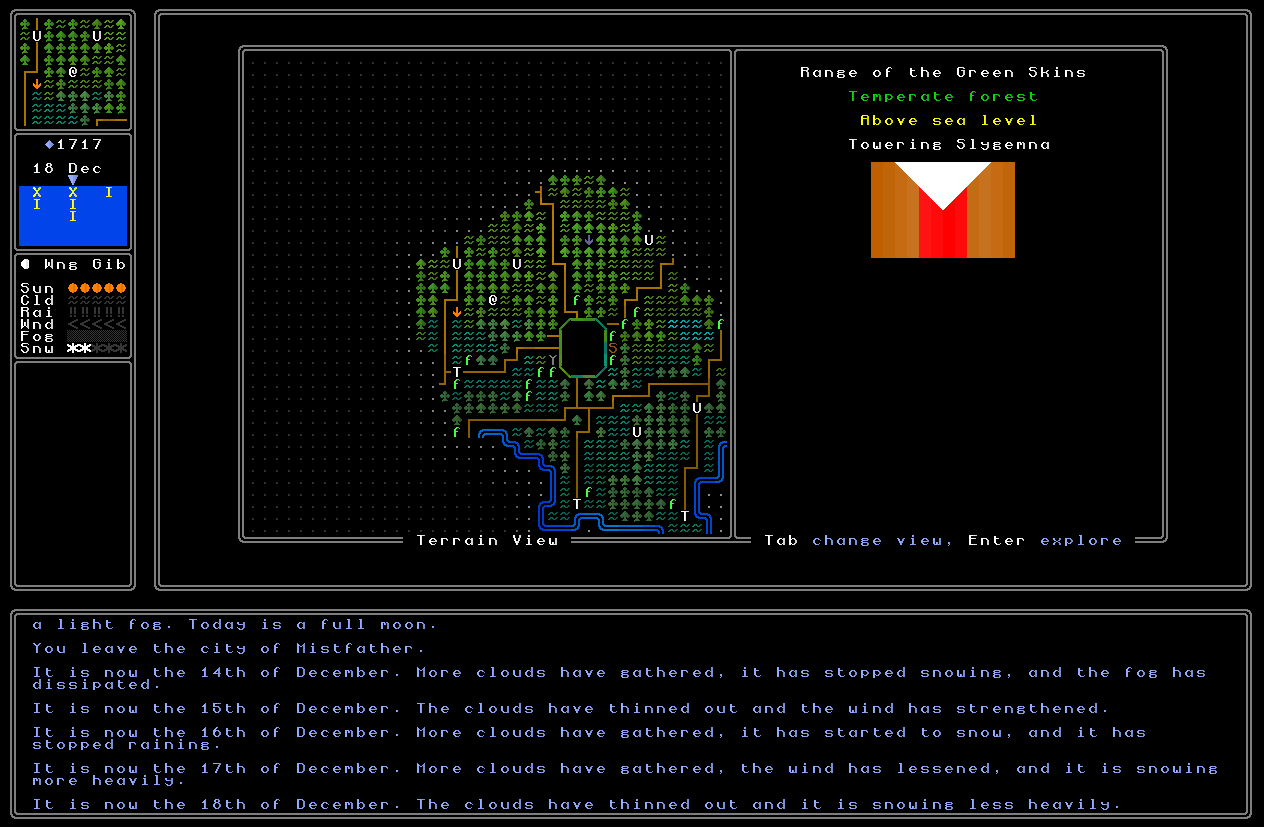
Additionally, I think the loss of unnecessary complexity is a great development. I’m not making Dwarf Fortress, where complexity is the point in and of itself – I’m making a core game mechanic that benefits from certain kinds of complexity, but only if they support and strengthen the core ideas. As such, you’ll also note, as an aside, how simple each of the new rules is! One sentence, compared to these vast, multi-layered things. The core mechanic is complicated and multi-layered that I now realise everything around it needs to be easy to understand, even if they can also generate interesting and complex strategic choices across a full playthrough (again, see the example of angering a religion, and then discovering you need something they have…). Now, with all this done, I’m confident that the removal of the supplies mechanic is only to the good, while the new trading mechanic is extremely simple to understand, and will only support rather distract from the core mechanic by offering compelling questions – what should I spend my very finite money on, and where – as well as enabling me to use coins in order to gesture towards other places the player might want to explore. Free movement around the game world – unless the player’s own actions have made this more challenging – only supports and strengthens the core gameplay mechanic. Equally, simple mechanics for selling, and having each currency only working for one nation, leaves us with simple but important choices that don’t slow down gameplay, don’t require massive calculation, but will integrate well more broadly with the players’ movement around the world, buying and selling items, the development of their character build (!), and all these sorts of things. Both support the core gameplay mechanic. And that’s the important change.
More generally, I’m excited by what these realizations herald. Now I’m shifting more and more into design over foundations and worldbuilding, it’s very thrilling to be having these sorts of debates with myself, and increasingly finding far smoother, and more elegant solutions to (or removals of!) things which currently aren’t really offering the player anything. This is exciting! And using new parts of the brain, too. But it’s exciting because it further reinforces the fact that although I’ve had spent a decade creating an incredibly detailed world, because the world is the foundation of the gameplay I intend, I’m now properly, properly shifting into full gameplay mode. It’s exciting having my brain thinking through these sorts of things I haven’t been thinking through in much detail before, and seeing what comes out, and both testing and imagining the intended play. Basically – I’m having a great time developing at the moment, and seeing so much come together at such a good speed. It’s honestly really gratifying after such a long sequence of time, and I’m just so excited to keep at it and keep going down this path.
What next?
So there we are friends! Two massively simplified, and indeed massively improved, mechanics. As the year progresses I would expect it to more of these entries to be focused on things like polish and making sure that the release makes sense to new player, as well as the actual development and implementation of the first test examples of the core mechanics. I think it’ll nevertheless be a while until another one of these, but when these changes came to me I felt it was important to get them implemented so that I – and later on others – will be able to usefully and properly play test here without anything getting in their way. I’m really pleased with these changes in the specific, but also really pleased by the broader changes they herald. As ever, please do let me know your thoughts in the comments, and please do share this post around if you think others would find it interesting! I really, really do appreciate it. Thanks for reading everyone, and I’ll see you in two weeks time for another update…
